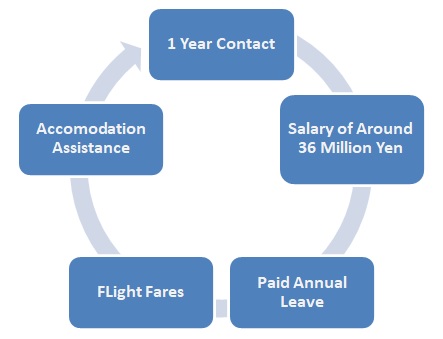Restructured 2020-2021 JET Programme Details That Every EFL Aspirant Should Know About For Teaching English in Japan Effectively
With a mesmerizing ethnic culture and a strong TEFL job market, Japan has been one of the most popular ESL/EFL destinations among the ESL teaching professionals. Japan offers huge EFL career opportunities. From teaching the English in numerous language centres to different state-run schools, institutes and even within companies, opportunities are huge.
However, the Japanese government runs the Japan Exchange and Teaching (JET) programme that has been a dominant choice to learn to teach English as a foreign language. This allows the ESL teaching professionals to live and work as a teaching assistant in Japan.
What is the Japan Exchange and Teaching (JET) Programme?
Japan Exchange and Teaching (JET) programme was first established in 1987 and since then it is being run by the Japanese government with the objective of enlightening language learning by promoting the cultural exchange in Japanese schools and institutes. This allows people to live and work as a teaching assistant in Japan. It was established to promote internationalization with rural Japan and now has developed to be one of the largest cultural exchange programmes. There is no age limit to apply to the JET Program.
There are three parts to the programme:
- ALT (Assistant Language Teacher)
- CIR (Coordinator for International Relations)
- SEA (Sports Exchange Advisors)
However, the huge mainstream of JET participants works as ALTs (Assistant Language Teacher).
Requirements for the Japan Exchange and Teaching (JET) Programme
Below are the eligibility criteria for the 2020-2021 JET Programme Year:
1. The applicant should not have lived in Japan for six or more years in total since 2010.
2. The candidate should be both mentally as well as physically healthy.
3. The entrant should be able to familiarize with living and working in Japan.
4. The aspirant should be interested in Japan.
5. The candidate should have a Bachelor’s degree.
6. The applicant should have the nationality of a participating country.
7. The candidate should not have participated in the Programme since the 2017 JET Programme year (inclusive of April 2017 arrivals) or have participated on the Programme for more than 5 years in total.
8. The applicant should not have declined a position on the Programme after receiving notification of assignment in the preceding JET Programme year.
9. The candidate should obey all Japanese laws.
10. Interviewees with a suspended jail term must have finished their period of probation by the time they submit their application form.
The eligibility criteria to apply for the JET Program is being determined by the Ministry of Internal Affairs and Communications, the Ministry of Foreign Affairs, the Ministry of Education, Culture, Sports, Science and Technology and CLAIR in Japan.
Participants usually sign a one-year agreement which can be reintroduced up to four times, for a maximum of five years. The JET candidates work all over the country, although some prefectures have more and some fewer JETs.
What’s included in the Japan Exchange and Teaching (JET) Programme?
The package includes:

What Do the JET Candidates Do On the JET Programme?
The Assistant Language Teachers (ALT) works as assistants to different Japanese English teachers. Usually, they do not take classes exclusively on their own. For the newly-qualified EFL/ESL teachers, this can be a good way of exploring themselves into teaching. However, these duties can vary depending on the school or institute.
Still, typically they are involved with:
- Preparing the different ESL teaching resources
- Teaching English classes together with a Japanese teacher
- Taking part in different extra-curricular activities
- Work across different ESL schools in the same area
As a fluent English speaker, your role will be to enhance the learners’ communication as well as verbal abilities. Also, you cannot select which grade level you want to teach, though you can request a grade level. Well, most of the time you will be placed based on which grade level the interviewers and Japanese government officials think about your credentials.
So, what happens when you and your partner both apply together and be placed in the same location and housing?
Most of the time, this usually doesn’t happen!
Will you both be accepted? Well, you can inform the team JET that you're applying with your spouse. From their side, they will try to place you in the same city or at least very close by. However, there’s no 100% guarantee that you would be placed together.
Can the non-native English speakers take part in the JET program?
Absolutely, as long as your country is registered as a participating country then you’re able to apply.
Is the TEFL qualification for JET obligatory?
Though it is not being listed as a needed requirement, it will provide your application with a real boost. We recommend you to get TEFL certified because the positions on the JET scheme are competitive and thus TEFL is crucial to be in with the best chance of securing a position.
Is it essential to know how to speak and write Japanese?
No, it is not required. However, for the position of the Coordinator for International Relations (CIR), candidates are being expected to have fluent written and spoken Japanese skills.
Can someone apply for both a position as an ALT and as a CIR?
Regrettably, if you first apply for the ALT position, then there is no option to be considered as a CIR candidate. However, if you apply as a Coordinator for International Relations (CIR), you can have the option to be considered for an Assistant Language Teacher (ALT) position though.
The JET applications generally open in October with the closing date for submission set sometime around November. If your application grows then you’ll be invited to an interview around January at the Japanese embassy and find out if you’ve fortified a position around sometime March/April. To grab this position, you need to learn to teach English as a Foreign Language. The programme is run by three ministries: the Ministry of Internal Affairs and Communications; the Ministry of Foreign Affairs; and the Ministry of Education, Culture, Sports, Science and Technology (MEXT) in conjunction with local authorities. The programme is administered by CLAIR (the Council of Local Authorities for International Relations).




